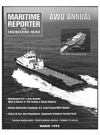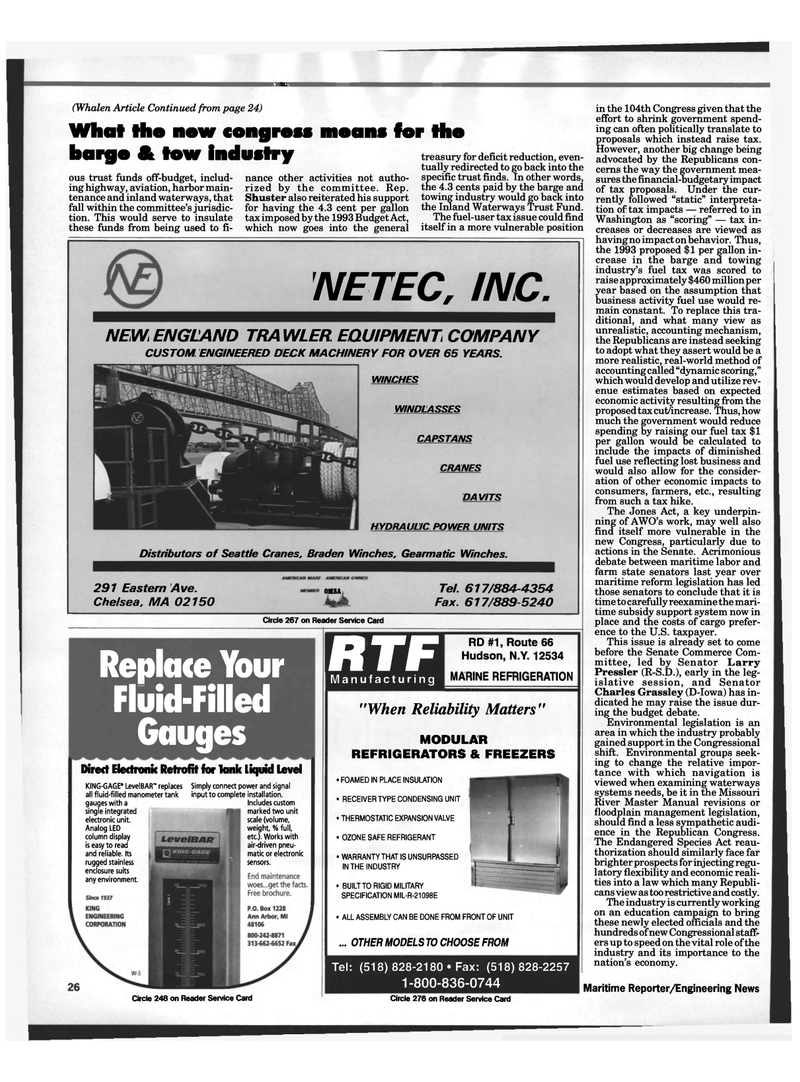
Page 24: of Maritime Reporter Magazine (March 1995)
Read this page in Pdf, Flash or Html5 edition of March 1995 Maritime Reporter Magazine
•••• (Whalen Article Continued from page 24)
What the new congress means for the barge Bt tow industry ous trust funds off-budget, includ- ing highway, aviation, harbor main- tenance and inland waterways, that fall within the committee's jurisdic- tion. This would serve to insulate these funds from being used to fi- nance other activities not autho- rized by the committee. Rep.
Shuster also reiterated his support for having the 4.3 cent per gallon tax imposed by the 1993 Budget Act, which now goes into the general treasury for deficit reduction, even- tually redirected to go back into the specific trust finds. In other words, the 4.3 cents paid by the barge and towing industry would go back into the Inland Waterways Trust Fund.
The fuel-user tax issue could find itself in a more vulnerable position
NETEC, INC.
NEW ENGLAND TRA WLER EQUIPMENT COMPANY
CUSTOM ENGINEERED DECK MACHINERY FOR OVER 65 YEARS.
WINCHES
WINDLASSES
CAPSTANS
CRANES
DAVITS
HYDRAULIC POWER UNITS
Distributors of Seattle Cranes, Braden Winches, Gearmatic Winches. 291 Eastern Ave.
Chelsea, MA 02150
OMSA Tel. 617/884-4354
Fax. 617/889-5240
Circle 267 on Reader Service Card
Replace Your
Fluid-Filled
Gauges
Dired Electronic Retrofit for lank liquid Level
KING-GAGE8 LevelBAR™ replaces Simply connect power and signal all fluid-filled manometer tank input to complete installation. gauges with a single integrated electronic unit.
Analog LED column display is easy to read and reliable. Its rugged stainless enclosure suits any environment.
Includes custom marked two unit scale (volume, weight, % full, etc.). Works with air-driven pneu- matic or electronic sensors.
Circle 248 on Reader Service Card
RTF
Manufacturing
RD #1, Route 66
Hudson, N.Y. 12534
MARINE REFRIGERATION "When Reliability Matters tt
MODULAR
REFRIGERATORS & FREEZERS • FOAMED IN PLACE INSULATION • RECEIVER TYPE CONDENSING UNIT • THERMOSTATIC EXPANSION VALVE • OZONE SAFE REFRIGERANT • WARRANTY THAT IS UNSURPASSED
IN THE INDUSTRY • BUILT TO RIGID MILITARY
SPECIFICATION MIL-R-21098E • ALL ASSEMBLY CAN BE DONE FROM FRONT OF UNIT ... OTHER MODELS TO CHOOSE FROM
Tel: (518) 828-2180 • Fax: (518)828-2257 1-800-836-0744
Circle 276 on Reader Service Card in the 104th Congress given that the effort to shrink government spend- ing can often politically translate to proposals which instead raise tax.
However, another big change being advocated by the Republicans con- cerns the way the government mea- sures the financial-budgetary impact of tax proposals. Under the cur- rently followed "static" interpreta- tion of tax impacts — referred to in
Washington as "scoring" — tax in- creases or decreases are viewed as having no impact on behavior. Thus, the 1993 proposed $1 per gallon in- crease in the barge and towing industry's fuel tax was scored to raise approximately $460 million per year based on the assumption that business activity fuel use would re- main constant. To replace this tra- ditional, and what many view as unrealistic, accounting mechanism, the Republicans are instead seeking to adopt what they assert would be a more realistic, real-world method of accounting called "dynamic scoring," which would develop and utilize rev- enue estimates based on expected economic activity resulting from the proposed tax cut/increase. Thus, how much the government would reduce spending by raising our fuel tax $1 per gallon would be calculated to include the impacts of diminished fuel use reflecting lost business and would also allow for the consider- ation of other economic impacts to consumers, farmers, etc., resulting from such a tax hike.
The Jones Act, a key underpin- ning of AWO's work, may well also find itself more vulnerable in the new Congress, particularly due to actions in the Senate. Acrimonious debate between maritime labor and farm state senators last year over maritime reform legislation has led those senators to conclude that it is time to carefully reexamine the mari- time subsidy support system now in place and the costs of cargo prefer- ence to the U.S. taxpayer.
This issue is already set to come before the Senate Commerce Com- mittee, led by Senator Larry
Pressler (R-S.D.), early in the leg- islative session, and Senator
Charles Grassley (D-Iowa) has in- dicated he may raise the issue dur- ing the budget debate.
Environmental legislation is an area in which the industry probably gained support in the Congressional shift. Environmental groups seek- ing to change the relative impor- tance with which navigation is viewed when examining waterways systems needs, be it in the Missouri
River Master Manual revisions or floodplain management legislation, should find a less sympathetic audi- ence in the Republican Congress.
The Endangered Species Act reau- thorization should similarly face far brighter prospects for inj ecting regu- latory flexibility and economic reali- ties into a law which many Republi- cans view as too restrictive and costly.
The industry is currently working on an education campaign to bring these newly elected officials and the hundreds of new Congressional staff- ers up to speed on the vital role of the industry and its importance to the nation's economy. 26 Maritime Reporter/Engineering News

 23
23

 25
25
